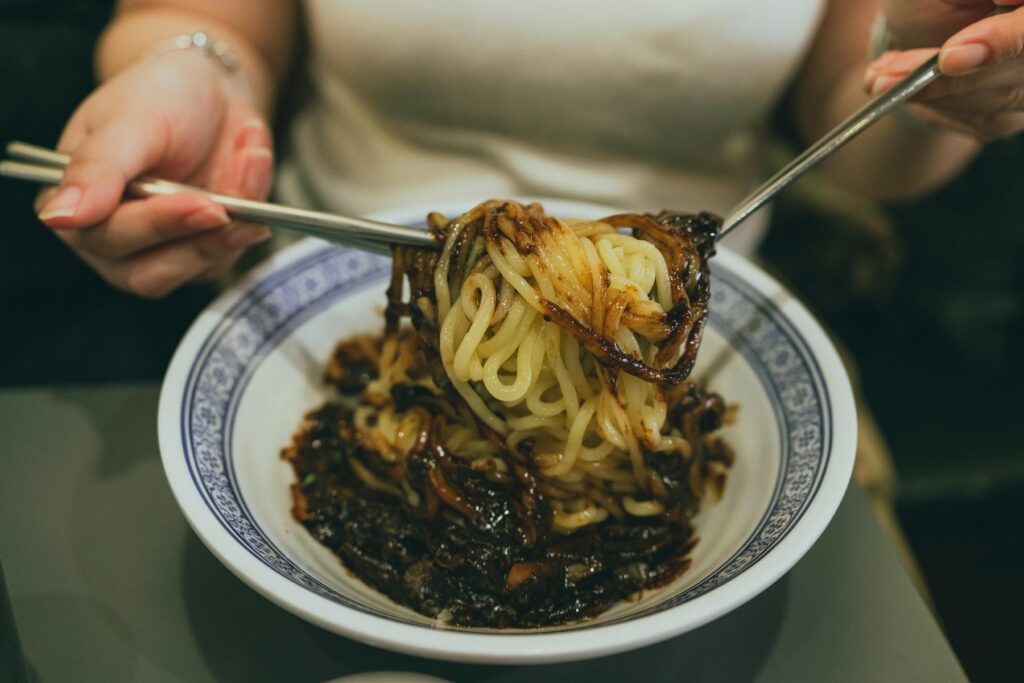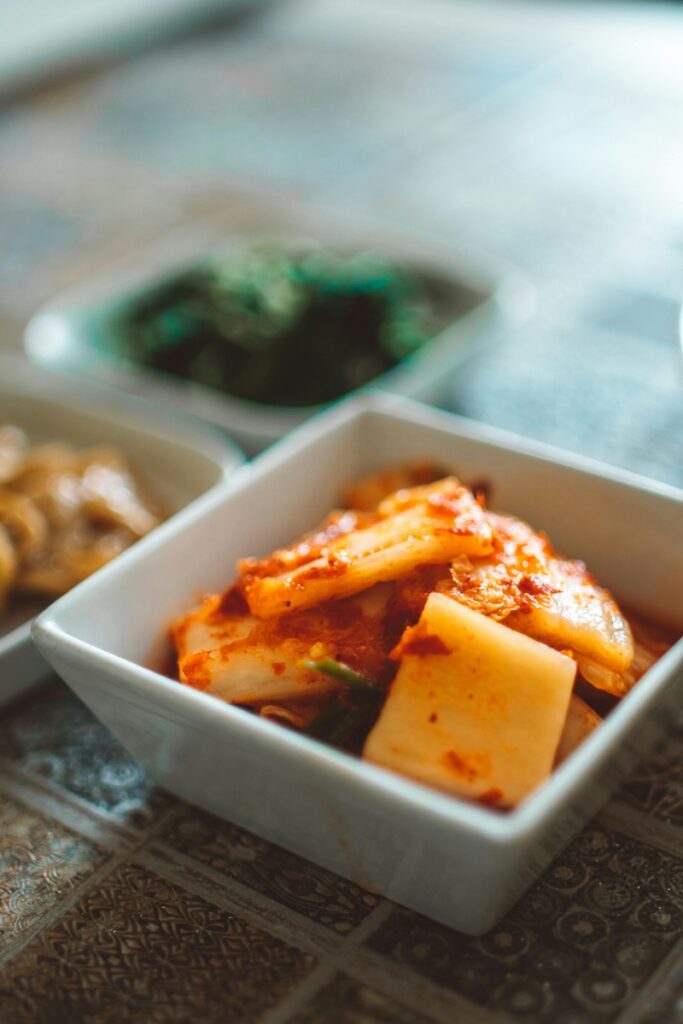📝 Introduction
Fermented foods are one of the biggest health trends in 2025—and Korea has been ahead of the game for centuries.
From kimchi to doenjang and gochujang, Korean cuisine is built around naturally fermented superfoods that boost gut health, improve digestion, and strengthen the immune system.
In this guide, you’ll learn:
- Why Korean fermented foods are nutritional powerhouses
- The science-backed health benefits
- The top 10 must-try fermented foods
- How to enjoy them for maximum health impact
If you’re looking for probiotic-rich foods to improve gut microbiome, Korean fermented foods are the perfect choice.
🧭 Table of Contents
- Why Fermentation is the Heart of Korean Cuisine
- The Science Behind Fermented Foods
- Health Benefits of Korean Fermented Foods
- Top 10 Traditional Korean Fermented Foods
- Kimchi: The King of Korean Fermentation
- Fermented Soy Products: Doenjang, Gochujang & Cheonggukjang
- Fermented Drinks: Makgeolli & Sikhye
- How to Add Korean Fermented Foods to Your Diet
- Where to Find Authentic Fermented Foods in Korea
- FAQ: Are Korean Fermented Foods Really Healthy?
1. Why Fermentation is the Heart of Korean Cuisine
Korean cuisine was shaped by harsh winters and the need for food preservation. Fermentation allowed Koreans to:
- Preserve vegetables for months (kimchi)
- Enhance flavors of soybean pastes and sauces
- Create probiotic-rich foods that improve digestion
This tradition of fermentation is why almost every Korean meal includes at least one fermented dish.
2. The Science Behind Fermented Foods
Fermentation uses beneficial bacteria (lactic acid bacteria) to break down sugars, creating:
- Probiotics → Improve gut microbiome
- Organic acids → Aid digestion
- Enhanced vitamins → Boost nutrient bioavailability
Modern studies show fermented foods:
✅ Support gut health & immunity
✅ Reduce inflammation
✅ Help with weight management & metabolic health
3. Health Benefits of Korean Fermented Foods
✅ Improve Gut Health
Kimchi & doenjang are rich in probiotics that balance gut bacteria.
✅ Boost Immunity
Fermentation increases antioxidants and vitamins like vitamin C, K, and B-complex.
✅ Aid Digestion
Enzymes in fermented foods help break down nutrients for easier absorption.
✅ Support Heart Health
Soy-based fermented products lower cholesterol and improve blood pressure.
✅ Anti-Inflammatory Effects
Probiotic bacteria reduce chronic inflammation linked to lifestyle diseases.
4. Top 10 Traditional Korean Fermented Foods
Here are the most popular Korean fermented foods you should try:
1️⃣ Kimchi (김치) → Fermented cabbage with chili, garlic, and ginger
2️⃣ Doenjang (된장) → Fermented soybean paste, used in soups & stews
3️⃣ Gochujang (고추장) → Spicy-sweet fermented chili paste
4️⃣ Cheonggukjang (청국장) → Strongly fermented soybean paste with rich probiotics
5️⃣ Makgeolli (막걸리) → Lightly alcoholic fermented rice drink
6️⃣ Jeotgal (젓갈) → Fermented seafood sauce used as seasoning
7️⃣ Sikhye (식혜) → Sweet fermented rice drink
8️⃣ Gan-jang (간장) → Naturally brewed Korean soy sauce
9️⃣ Dongchimi (동치미) → Mild, watery radish kimchi
10️⃣ Yakju (약주) → Traditional medicinal fermented rice wine
5. Kimchi: The King of Korean Fermentation
Kimchi is Korea’s most iconic fermented food, made from cabbage, radish, or cucumber.
- Probiotics: Lactobacillus plantarum improves gut microbiota
- Vitamins: Rich in vitamin A, C, and antioxidants
- Low-calorie superfood: Only ~30 calories per 100g
👉 Fun fact: Koreans eat ~50 pounds of kimchi per person each year!
6. Fermented Soy Products: Doenjang, Gochujang & Cheonggukjang
Soy fermentation is another pillar of Korean nutrition:
- Doenjang: Miso-like paste with deep umami → great for gut & bone health
- Gochujang: Chili + glutinous rice + fermented soybeans → adds probiotics & metabolism-boosting capsaicin
- Cheonggukjang: Strong smell but highest probiotic count → linked to better digestion
✅ Health benefits: Soy isoflavones → support heart health, bone density, and hormone balance
7. Fermented Drinks: Makgeolli & Sikhye
- Makgeolli: A slightly alcoholic, probiotic-rich rice wine → contains lactic acid bacteria & amino acids
- Sikhye: Sweet rice-based fermented drink → helps digestion after heavy meals
8. How to Add Korean Fermented Foods to Your Diet
✅ Start your day with kimchi → as a side dish or in a smoothie bowl
✅ Use gochujang as a healthy sauce → for rice bowls or wraps
✅ Add doenjang to soups → for probiotics & deep flavor
✅ Snack on seaweed kimchi → for a low-calorie gut-friendly treat
✅ Drink makgeolli occasionally → for probiotics + mild relaxation
9. Where to Find Authentic Fermented Foods in Korea
- Local markets (전통시장) → Handmade kimchi & pastes
- Temple cuisine restaurants → 100% vegan fermented dishes
- Supermarkets → Ready-made kimchi, gochujang, and doenjang
- Fermentation museums → Learn traditional methods (Jeonju & Sunchang)
FAQ: Are Korean Fermented Foods Really Healthy?
Q1: Do fermented foods have too much salt?
A: Some can be salty, but eating in moderation provides benefits without risk.
Q2: Are probiotics in kimchi alive?
A: Yes, especially if it’s unpasteurized and stored properly.
Q3: Can fermented foods help weight loss?
A: Yes, they improve digestion & metabolism while being low in calories.
Q4: Are all kimchi types vegan?
A: Some contain fish sauce, but vegan kimchi is available.
Q5: How often should I eat fermented foods?
A: Nutritionists recommend 1–2 servings daily for gut health.
✍️ Conclusion
Korean fermented foods are delicious, nutrient-dense, and scientifically proven to improve gut health, boost immunity, and enhance overall well-being.
From kimchi to fermented soybean pastes, these traditional superfoods are low in calories, rich in probiotics, and full of antioxidants.
Adding just a little Korean fermentation to your diet can bring big health benefits—naturally.





